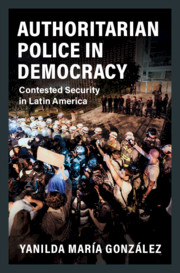Book contents
- Authoritarian Police in Democracy
- Cambridge Studies in Comparative Politics
- Authoritarian Police in Democracy
- Copyright page
- Contents
- Figures
- Tables
- Acknowledgments
- 1 Police
- 2 Ordinary Democratic Politics and the Challenge of Police Reform
- Part I Persistence
- Part II Reform
- References
- Index
- Other Books in the Series (Continued from page ii)
2 - Ordinary Democratic Politics and the Challenge of Police Reform
Published online by Cambridge University Press: 30 October 2020
- Authoritarian Police in Democracy
- Cambridge Studies in Comparative Politics
- Authoritarian Police in Democracy
- Copyright page
- Contents
- Figures
- Tables
- Acknowledgments
- 1 Police
- 2 Ordinary Democratic Politics and the Challenge of Police Reform
- Part I Persistence
- Part II Reform
- References
- Index
- Other Books in the Series (Continued from page ii)
Summary
Chapter 2 introduces a two-stage theory of institutional continuity and reform, laying out how societal preferences over the distribution of protection and repression shape politicians’ decisions between the status quo of authoritarian coercion and reform to promote democratic coercion. Far from constituting a failure of democratic processes, politicians’ decisions to either maintain the status quo of authoritarian coercion or undertake police reform both result from ordinary democratic politics. I argue that, even under the constraints posed by the structural power of police, shifts in the convergence of societal preferences over policing and security and a robust political opposition can serve as key drivers of reform by raising the costs to the incumbent of not reforming the police. The theory yields two key predictions. When societal preferences over policing and security are fragmented, politicians have incentives to pursue accommodation with the police, wherein they grant police greater autonomy in exchange for cooperation in the selective distribution of coercion. This favors the persistence of institutional weakness and authoritarian patterns of coercion. On the other hand, incumbents are likely to pursue democratic police reform when societal preferences converge and when they face an electoral threat from a robust political opposition.
Keywords
- Type
- Chapter
- Information
- Authoritarian Police in DemocracyContested Security in Latin America, pp. 27 - 62Publisher: Cambridge University PressPrint publication year: 2020



